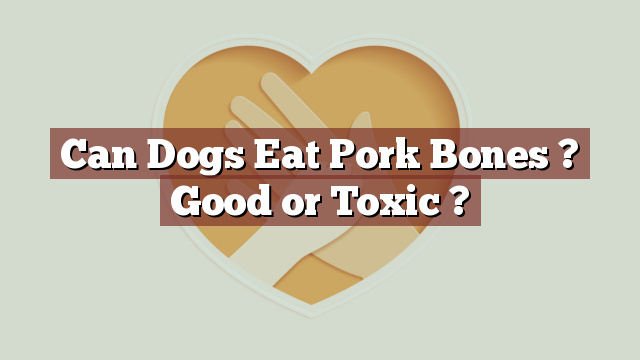Can Dogs Eat Pork Bones? Good or Toxic?
It is crucial for pet owners to be aware of the foods that are safe for their furry friends to consume. One common question that arises is whether dogs can eat pork bones. In this article, we will delve into the nutritional value of pork bones, assess their safety and toxicity for dogs, discuss potential risks or benefits, and provide guidance on what to do if your dog has consumed pork bones.
Nutritional Value of Pork Bones: Protein, Fat, and Minerals
Pork bones are known to be a rich source of protein, fat, and minerals. Protein is essential for dogs as it helps build and repair tissues, supports the immune system, and aids in the production of enzymes and hormones. Fat, when consumed in moderation, provides a concentrated source of energy for canines. Additionally, pork bones contain minerals such as calcium and phosphorus, which are vital for maintaining strong bones and teeth.
Can Dogs Eat Pork Bones? Assessing Safety and Toxicity
Can dogs eat pork bones? The answer is no. While dogs may be instinctively drawn to bones, it is important to note that pork bones can pose serious risks to their health. The main concern lies in the fact that pork bones can splinter easily, leading to choking hazards or causing internal damage. These sharp fragments can lacerate the digestive tract, leading to severe injuries and potential life-threatening complications.
Scientific and veterinary insights emphasize the potential dangers of feeding dogs pork bones. The American Veterinary Medical Association (AVMA) strongly advises against giving any type of bone to dogs, including pork bones. It is crucial to prioritize the safety of our furry companions and opt for safer alternatives.
Potential Risks or Benefits of Feeding Dogs Pork Bones
Feeding dogs pork bones can expose them to various risks. Apart from the risk of bone splintering and causing internal injuries, there is also the possibility of teeth fractures or oral injuries. Moreover, consuming excessive amounts of fat from pork bones can result in gastrointestinal upset, such as diarrhea or pancreatitis.
On the other hand, there are no significant health benefits that dogs can derive from consuming pork bones. The nutritional needs of dogs can be adequately met through a balanced diet that includes appropriate amounts of protein, fat, and minerals from other safe sources.
My Dog Ate Pork Bones: Steps to Take and When to Worry
If your dog has accidentally consumed pork bones, it is crucial to take immediate action. First and foremost, observe your dog for any signs of distress or discomfort. If your dog is exhibiting symptoms such as choking, vomiting, diarrhea, abdominal pain, or difficulty breathing, contact your veterinarian immediately. They will be able to provide guidance based on your dog’s specific situation and may recommend bringing your dog in for an examination.
Conclusion: Weighing the Risks and Benefits of Pork Bones for Dogs
In conclusion, it is best to avoid feeding dogs pork bones altogether due to the potential risks they pose to their health. While pork bones may offer certain nutritional benefits, these can be obtained from safer alternatives. Ensuring a balanced and appropriate diet for your furry friend is crucial for their overall well-being. If your dog accidentally consumes pork bones or any other potentially dangerous substance, consult your veterinarian promptly to ensure the best course of action and minimize any potential harm.
Thank you for investing your time in exploring [page_title] on Can-Eat.org. Our goal is to provide readers like you with thorough and reliable information about various dietary topics. Each article, including [page_title], stems from diligent research and a passion for understanding the nuances of our food choices. We believe that knowledge is a vital step towards making informed and healthy decisions. However, while "[page_title]" sheds light on its specific topic, it's crucial to remember that everyone's body reacts differently to foods and dietary changes. What might be beneficial for one person could have different effects on another. Before you consider integrating suggestions or insights from "[page_title]" into your diet, it's always wise to consult with a nutritionist or healthcare professional. Their specialized knowledge ensures that you're making choices best suited to your individual health needs. As you navigate [page_title], be mindful of potential allergies, intolerances, or unique dietary requirements you may have. No singular article can capture the vast diversity of human health, and individualized guidance is invaluable. The content provided in [page_title] serves as a general guide. It is not, by any means, a substitute for personalized medical or nutritional advice. Your health should always be the top priority, and professional guidance is the best path forward. In your journey towards a balanced and nutritious lifestyle, we hope that [page_title] serves as a helpful stepping stone. Remember, informed decisions lead to healthier outcomes. Thank you for trusting Can-Eat.org. Continue exploring, learning, and prioritizing your health. Cheers to a well-informed and healthier future!

